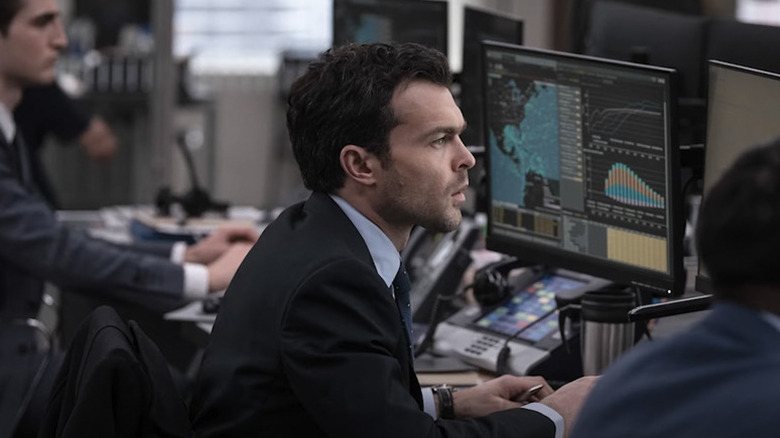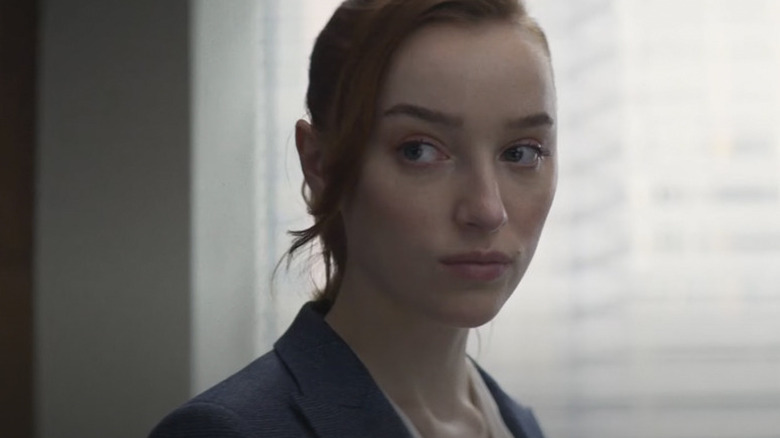Fair Play Review: A Couple Experiences Shifting Power Dynamics In This High-Stakes Thriller [Sundance]
Emily (Phoebe Dynevor) and Luke (Alden Ehrenreich) can't keep their hands off each other. The two twentysomethings are seemingly as in love with each other as they are with their jobs; they both work as mid-level employees at a high-powered Wall Street hedge fund, and have fully devoted their adult lives to their careers. It's an alpha male environment where only the ruthless survive, so the couple has kept their relationship secret from their colleagues, who would chew them up and spit them out if they learned the truth about their violation of company rules. There's a lot of employee turnover in a place like this, and when one of the managers can't hack it and gets fired, rumor has it Luke is going to score a big promotion. Emily is thrilled for him: They just got engaged, and things are looking up for the pair. But it turns out Emily is the one who actually gets the promotion. Luke may have some good instincts, but Emily is a prodigy, hand-picked by the company's taciturn, no-nonsense boss (Eddie Marsan).
While Luke initially puts on a show of (unconvincing) support for his fianceé, he's crestfallen that this opportunity has been, in his warped view, snatched from his own grasp. He's wildly insecure and full of unearned confidence, a dangerous combination that curdles into a disdain for Emily that becomes harder and harder for him to stifle. The fact that he has to report to her at work and endure the whispers of his male co-workers who suggest she slept her way to the top doesn't help his bruised ego. Emily is sympathetic, but doesn't understand why he's quite so put out — can't he just be happy for her and celebrate her success? — and it's not long before he begins to show her how he really feels about the situation. Spoiler alert: Things don't go well.
Chloe Domont is a new filmmaker to watch
The opening shot of "Fair Play," writer/director Chloe Domont's feature debut, features Emily emerging out of the shadows while smoking a cigarette on a balcony, looking like something out of a classic film noir. But Domont isn't concerned with pastiche or paying loving homage to films that came before. This is a thoroughly modern movie, one that takes conversations our culture has been having for years and runs them through a gauntlet. Until real-world gender and power dynamics in the workplace become a non-issue, films like this will serve as a timestamp of society's progress (or lack thereof). Domont is interested in the corrupting nature of power, and how single-minded devotion to climbing the corporate ladder can rip through a relationship like a disease.
Through Menno Mans' crisp cinematography and Franklin Peterson's precise editing, Domont whisks us deeper into the financial world, raising the stakes in a huge way as characters win and lose massive amounts of money in the blink of an eye. Even if you don't understand anything about stock markets and shares (raises hand), you never feel lost in the weeds of the terminology; the dynamics are always clearly established, and you get a sinking feeling in the pit of your stomach when characters start to gamble with gigantic sums of investor money as a way to assert their value in the office.
A twisted power game comes to a head
The biggest strengths of the film are its sharp script and phenomenal lead actors, both of whom give committed performances which vacillate between ruthless pragmatism and explosive emotionality. Dynevor lends Emily a complexity that makes her always compelling to watch, and Ehrenreich, who hasn't been in much since 2018's "Solo: A Star Wars Story," perfectly captures the toxicity of a self-centered jerk who has fully bought into his own legend. "Fair Play" argues that for the ultra-ambitious, capitalism breeds sickness — one that can shatter every other aspect of a person's life. Luckily for us, the results are electric and perversely thrilling.
/Film Review: 9 out of 10


